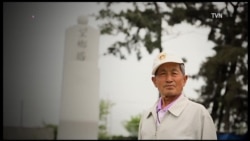Next month, barring a North Korean missile test or another incident that might escalate regional tensions, North and South Korea will arrange reunions for 200 family members who were forced apart by division of the country 70 years ago.
So far the program has reconnected only a fraction of the more than 60,000 divided Korean families, and activists have been appealing to both Koreas to put aside political differences on this issue.
“When it comes to the reunions of the separated families we actually have to think of this as a basic human right,” said Shim Gu-seop of the Inter-Korean Separated Family Association.
Sporadic contact
Beginning in 2000, the program supporting these official family reunions was suspended after North Korea fired artillery shells at a South Korean border island. The last family reunions were in 2014.
A new documentary produced by South Korean broadcaster TVN is also trying to increase public awareness to make reunions of separated families a top priority in inter-Korean relations.
The documentary recounts how thousands of people were forced to leave their families during the Korean War and have since been unable to return home even for a visit because of the division and tensions that exist between the countries.
The TVN producers interviewed more than 100 separated family members, most of whom are now in their 70s or 80s. Because North Korea restricts travel and most communication with the outside world, many have not been in contact with their families since they were teenagers. The documentary addresses the emotional pain these individuals still carry, not knowing the fate of their own families.
“The key message that we wanted to deliver through this program is the value of family, putting aside political issues or policy related issues,” said TVN producer Lee Sang-rok.
Political edge
Lee Chang-ju, who is now 80 years old, participated in the 2014 family reunion.
During the Korean War she came south to escape the fighting. After the war she could not return home and has not had any contact with her family since.
For Lee the reunion was bittersweet. Prior to the reunion she found out her brother and sister had already died. But at the reunion site she met for the first time her two nephews who live in the North, and they told her about her family back home.
“Contrary to my expectations the family members in North Korea were having a good life and I thought it was very good and I found a lot of comfort in them,” Lee said.
South Korea sees organizing these joint family reunions as trust building exercises that could hopefully lead to more engagement and point the way to future Korean unification.
The North Korean side has been more restrictive in allowing and monitoring the reunions and has been more overt at trying to use them for propaganda purposes.
Lee Chang-ju said she sensed that her nephews could not be totally candid during her reunion and they encouraged her to make a public statement in praise of North Korean leader Kim Jong Un for allowing the reunion to take place.
“There were a lot of journalists from North Korea who were trying to take photos of me saying hooray or writing some thank you note to the North Korean leader but I didn’t respond,” said Lee.
In the past, activists arranged inter-Korean family contacts and unofficial reunions mostly in China near the North Korean border, but increased security has made it more difficult.
The documentary notes how China and Taiwan, and even formerly divided Germany, were able to facilitate family visitation arrangements, even during the height of the cold war. But in Korea, reunions remain a political casualty of the ideological stand-off that continues to divide the countries.
With tensions mounting over a possible North Korea long-range ballistic missile test, there are no signs the two sides are ready to stop playing politics with separated families.
Youmi Kim in Seoul contributed to this report.






